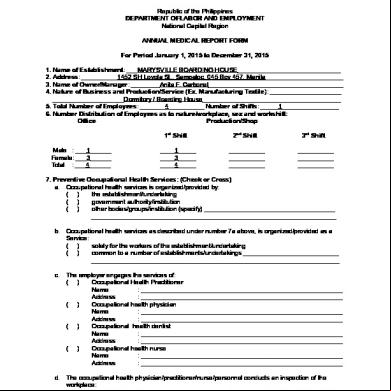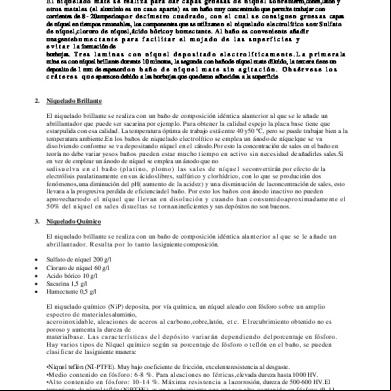Critical Analysis #1- Plasma International 71j3s
This document was ed by and they confirmed that they have the permission to share it. If you are author or own the copyright of this book, please report to us by using this report form. Report 2z6p3t
Overview 5o1f4z
& View Critical Analysis #1- Plasma International as PDF for free.
More details 6z3438
- Words: 664
- Pages: 2
1
T.W. Zimmerer and P.L. Preston’s Case study on Plasma International delves into the issue of morality and ability of business corporations. Plasma International company, headquartered in Tampa, Florida, found new sources of blood in underdeveloped countries, purchased it for 90 cents a pint and resold blood to hospitals in the United States or South America at $150 a pint. City activists were outraged and demanded the company’s licenses to conduct business be revoked. Jack Smith, the company’s founder claimed his company was simply fulfilling the basic duties of a business: make a profit. The company aims to supply “safe, uncontaminated, and reasonably priced”(Donaldson and Werhane, 157) to people in need. After several cases of blood contaminated with hepatitis, the company hired highly qualified team of medical consultants to conduct tests and find new sources. When asked about the justification of their price per pint, Mr. Smith vaguely answered claiming their high prices are influenced by “ a lot of costs the public wasn’t aware of ”(Donaldson and Werhane, 157). There were no further details available for the high costs about which Mr. Smith spoke. Although the company is under extreme scrutiny for its activities, there are several ethical theories that, when utilized as a perspective lens, can Plasma International’s operations. Similarly, there are ethical theories that wholeheartedly condone the company’s work and establish a need for change. Ethical theories aside, I believe that the actions of Plasma International Company are not justifiable. Pouncing on the poor while generating immense profits should not be tolerated in modern society. Buying an indispensible commodity at a low price and selling it at prices over 16,000% higher is sacrilegious. However, according to the ethical theory of utilitarianism, Plasma International’s operations are morally sound. Utilitarianism is a normative ethical theory based on consequences, which states that proper action increases overall happiness for the greatest number of people. The good generated must
2 outweigh the harm that results from that action. In the case of Plasma International, one can argue that there are more people benefiting than being harmed. In response to critics who claim they should have a higher ethical responsibility, a utilitarian would claim that the ethical standards should and would not change relative to the good generated by Plasma International because in their eyes, this un-marketed commodity is still maximizing benefit for all parties. Although utilitarianism concurs with the acts of Plasma International, the Deontological Argument would argue otherwise. The first part of Immanuel Kant’s deontological theory states that we should act only on maxims we can will to be universal laws of nature. If every company that needed inexpensive "supply" went to a third-world nation to buy it, there would be more human rights violations. The second portion states people should not be used as a means to an end. In this case, Plasma International is using the African tribes to their advantage by purchasing low cost plasma and selling it to reach their goal: profitability. The third formulation of Kant’s categorical imperative directs focus to the community. A corporation is a representation of a community, and as an inherited right of a community, each member deserves the right to express their views, oppositions (if any), and concerns with the community itself. In addition, the intentions behind actions are critical. Plasma Internationals intentions are debatable, but the most evident intention is to make a profit out of business operations. Mr. Smith’s denial to further evaluate the costs attributes to my standing on the issue. The contract signed with the African tribes can be considered advantageous and should be vetted to acquire further details. Legally binding the African tribes to pay a fixed price over an X amount of years shows the astute nature of Plasma International and their ability to profit off of the needy Africans. If every firm imitated Plasma Internationals operations, the use of third world labor would dramatically increase. Thus, the anger displayed by the community is justifiable on many .
T.W. Zimmerer and P.L. Preston’s Case study on Plasma International delves into the issue of morality and ability of business corporations. Plasma International company, headquartered in Tampa, Florida, found new sources of blood in underdeveloped countries, purchased it for 90 cents a pint and resold blood to hospitals in the United States or South America at $150 a pint. City activists were outraged and demanded the company’s licenses to conduct business be revoked. Jack Smith, the company’s founder claimed his company was simply fulfilling the basic duties of a business: make a profit. The company aims to supply “safe, uncontaminated, and reasonably priced”(Donaldson and Werhane, 157) to people in need. After several cases of blood contaminated with hepatitis, the company hired highly qualified team of medical consultants to conduct tests and find new sources. When asked about the justification of their price per pint, Mr. Smith vaguely answered claiming their high prices are influenced by “ a lot of costs the public wasn’t aware of ”(Donaldson and Werhane, 157). There were no further details available for the high costs about which Mr. Smith spoke. Although the company is under extreme scrutiny for its activities, there are several ethical theories that, when utilized as a perspective lens, can Plasma International’s operations. Similarly, there are ethical theories that wholeheartedly condone the company’s work and establish a need for change. Ethical theories aside, I believe that the actions of Plasma International Company are not justifiable. Pouncing on the poor while generating immense profits should not be tolerated in modern society. Buying an indispensible commodity at a low price and selling it at prices over 16,000% higher is sacrilegious. However, according to the ethical theory of utilitarianism, Plasma International’s operations are morally sound. Utilitarianism is a normative ethical theory based on consequences, which states that proper action increases overall happiness for the greatest number of people. The good generated must
2 outweigh the harm that results from that action. In the case of Plasma International, one can argue that there are more people benefiting than being harmed. In response to critics who claim they should have a higher ethical responsibility, a utilitarian would claim that the ethical standards should and would not change relative to the good generated by Plasma International because in their eyes, this un-marketed commodity is still maximizing benefit for all parties. Although utilitarianism concurs with the acts of Plasma International, the Deontological Argument would argue otherwise. The first part of Immanuel Kant’s deontological theory states that we should act only on maxims we can will to be universal laws of nature. If every company that needed inexpensive "supply" went to a third-world nation to buy it, there would be more human rights violations. The second portion states people should not be used as a means to an end. In this case, Plasma International is using the African tribes to their advantage by purchasing low cost plasma and selling it to reach their goal: profitability. The third formulation of Kant’s categorical imperative directs focus to the community. A corporation is a representation of a community, and as an inherited right of a community, each member deserves the right to express their views, oppositions (if any), and concerns with the community itself. In addition, the intentions behind actions are critical. Plasma Internationals intentions are debatable, but the most evident intention is to make a profit out of business operations. Mr. Smith’s denial to further evaluate the costs attributes to my standing on the issue. The contract signed with the African tribes can be considered advantageous and should be vetted to acquire further details. Legally binding the African tribes to pay a fixed price over an X amount of years shows the astute nature of Plasma International and their ability to profit off of the needy Africans. If every firm imitated Plasma Internationals operations, the use of third world labor would dramatically increase. Thus, the anger displayed by the community is justifiable on many .










